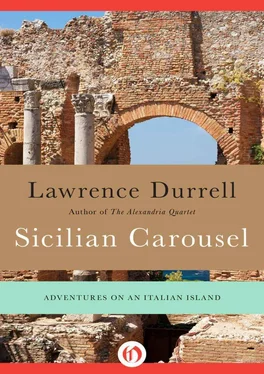Yes, the caution is worth heeding, and luckily I was able to turn to the admirably phrased introduction of Jane Harrison on the subject — for she had chosen him as the only real guide to Athens. The Emperor Hadrian (who by the way was much beloved by the Sicilians because of all he did for the island) made a valiant attempt to makeover Athens anew, to restore its former glories by the addition of new temples and restored monuments. His passion was an antiquarian one which reminds us very much of the contemporary British or German attitudes. But work as he might, the soul of the city had fled, and all he ever achieved was the snobbish embalming of a once magnificent corpse.
He supplied anew all the outside apparatus of a vigorous city life but he could not stay the progress of the death that is from within. Accordingly this prosperous period of Hadrian’s reign has the irony of a magnificence purely external. Pausanias, of course, did not feel the pathos of the situation; perhaps no contemporary thinker could have stood sufficiently aloof to see how hollow was this Neo-Attic revival. Greece endured to the full the last ignominy of greatness; she became the fashion of the vulgar .
I fear these last fine phrases could be aimed a little bit in our direction — in the direction of the little red bus with Mario at the wheel, and the twenty or so captives of tourism tiptoeing around monuments they do not comprehend with a grave piety they do not feel. Pausanias himself complains petulantly against the tourism of his day, for the Romans could not help but feel that Greece had the edge on them, that in some undefined way they remained forever provincial, out of the main swim of culture despite all their own real greatness and their own mighty and original culture. Somehow there was a tug towards Greece, and the young Romans must have made a sort of Grand Tour of the now ruined and blasted land, still eager to be accredited to the mysteries (which had lost all their numen , all their spiritual sap) or to win a prize for a chariot race at Olympia, or a derivative play in a Greek theater. They were marked by the thumbprint of an unnatural vulgarity, which they never succeeded in surmounting.
But as for Pausanias, thank goodness for his passionate antiquarianism; at least he has managed to leave us an extensive notebook of all that we have lost. It is something. For most of us tend to think of the Acropolis, for example, as a stately marble hill approached by the Propylaea and crowned by the austere, almost abstract beauty of the Parthenon’s white catafalque. But it is from the jottings of this little Roman antiquarian that we see something much closer to the original during the days when it still “worked,” still performed its vatic duties for the whole Greek race. How different a picture! In its clutter and jumble one cannot help thinking of the equivalent jumble of modern Lourdes or Byzantine Tinos today.
Only Pausanias tells of the color and life, the realism, the quaintness, the forest of votive statues, the gold, the ivory, the bronze, the paintings on the walls, the golden lamps, the brazen palm tree, the strange old Hermes hidden in myrtle leaves, the ancient stone upon which Silenus sat, the smoke-grimed images of Athene, Diitrephes all pierced with arrows, Kleoitas with his silver nails, the heroes peeping from the Trojan Horse, Anacreon singing in his cups; all these, if we would picture the truth and not our own imagination we must learn of from Pausanias.
Those who tiptoe round the Acropolis today in their thousands hardly realize that they are looking at something like an empty barn.… “And by the same token,” I told Deeds, who was standing on his head on the sunny balcony next to mine, for he did yoga like most Indian Army officers, “by the same token it is the merest vainglory to tell ourselves that we are going to see anything in Syracuse as the Greeks left it — it’s simply a hollow shell from which the spirit has fled. Even the temples are for the most part wiped out, gnawed down to their foundations like the molars of some old dog.” I was repeating and improvising upon the caveat of Martine who had once written to me about Pausanias apropos of the Minoan reconstructions in Crete, saying how tasteless they seemed to her. “They robbed my imagination of its due, and vulgarized something I expected to find elegant and spare and cruel — a fit sea nurse for the mainland cultures which Minoa influenced, perhaps even founded.”
“If you tell Beddoes that,” said Deeds, “he will at once ask for his money back.” I could see that he was not going to let these grave considerations disturb his mature pleasure at sightseeing in an island which had become as precious to him as it had once been for Martine. In a sense he was right. If the Greeks were gone and their monuments were dust there were still vestiges of their way of life to be found in the food, the wine and the wild flowers of the land they had inhabited and treasured.
Today, then, Syracuse waited for us to disinter its ancient glories by an act of the imagination, aided by whatever Roberto could tell us, which was not much. Oleanders, however, and sunny white streets leading down to a bright dancing sea! There was pleasure in the air, and I did not need to sniff the horizon to determine that we were in one of those benign spots which favor happiness, encourage “all the arts — even love and introspection” as Martine used to say when she awoke from a spell of sleep on the green grass of the Abbey. Today the Carousel tackled its breakfast with dispatch and good humor; the Bishop forgot to tell the world how much he preferred bacon and tomatoes in the morning, a very good sign indeed for the rolls were not very fresh and the coffee insipid.
Even Beddoes — Beddoes had washed . He had parted his hair in the middle and combed down his thatch of wet ringlets with energy and science. He came up to me as I stood on the terrace with my coffee, watching Mario growling at the porters and feeling the fine morning sun on my fingers and forehead — omens of a good day to come. Miss Lobb was already aboard the bus, and remarking this Beddoes said: “If you asked me why one felt compelled to like Miss Lobb I should reply that it was because she was so completely herself. She has grown on me. Or perhaps it is the heat.” It was not the heat, for Miss Lobb had grown on us all. Gradually the outlines of her splendid personality had flowered in the Sicilian summer, her robust but handsome figure had emerged now clad in those rather expensive summer prints from Liberty’s or Horrocks with becoming style. There was a touch of cretonne-covered sofa about her which was somehow suitable to her general style of mind. She introduced herself with simplicity as Miss Lobb but always added the phrase “Of London” as if it were a lucky charm. She was indeed the spirit of London — the “best-foot-forward” of that rainy but warm-hearted town.
Miss Lobb was a barmaid and she worked in the Strand in what she described as a “good house”; once again adding an explanatory phrase in the words “a tied house,” whatever that was. Her warmth and good humor were infectious, and she talked English loudly but with grace to everyone, even when she fully realized that they did not understand what she was saying. “I think what I like about her,” said Beddoes, “is her way of saying ‘OOPS!’ when she trips over a bush, and then flicking up her skirts in a skittish manner.” Yes, but that was not all. She also had a way of crying “Righty ho!” which brought all hands running on deck to reef sail. Beddoes watched her fondly as she sat; reading a novel by Marie Corelli which she had stolen from the last hotel. Perhaps it was the association with bars? Though Miss Lobb did not herself drink, or so she said. Yet her frame was broad and buxom and her face large and red with a strongly arched nose and large sound white teeth. Later she was to explain to Deeds that even if one did not drink the mere fact of working near the stuff made one breathe it in through the pores — the reason why barmaids were always on the stout side. I forgot what he answered to this; but he too like the rest of us was a willing captive of her charms. And when she began a sentence with the phrase “Lord love yer now” he winced with pleasure; it was the very soul of London speaking. “I think I am deeply in love with little Lobbie; in love for the first time in my life,” said Beddoes and I gazed at him anxiously, wondering if perhaps he had been drinking before breakfast. Little Lobbie!
Читать дальше











